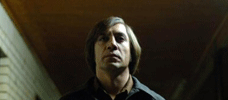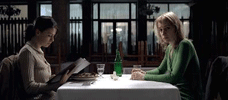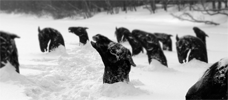Reviews
Sean Penn
USA, 2007
Credits
Review by Rumsey Taylor
Posted on 11 October 2007
Source Paramount Vantage 35mm print
Categories The 32nd Toronto International Film Festival
In April 1992 a young man from a well-to-do family hitchhiked to Alaska and walked alone into the wilderness north of Mt. McKinley. His name was Christopher Johnson McCandless. He had given $25,000 in savings to charity, abandoned his car and most of his possessions, burned all the cash in his wallet, and invented a new life for himself. Four months later, his decomposed body was found by a moose hunter…
Prefaced by the above text, Jon Krakauer’s nonfiction bestseller Into the Wild mythologizes the plight of Chris McCandless, who spent the final two years of his life in exile from every relationship he had theretofore established, and in revocation of even the most basic amenities of comfort. McCandless’ fate is tragic, but his is a tragedy pursuant to an innate necessity for truth and freedom.
Krakauer’s book was given to me the summer after I graduated from high school, and to my mind there is not a more potent text to enchant the impressionable mind of a seventeen-year-old. Reading it for the first time (and multiply since) accompanied a nascent want of individuality, as well as the realization that I, for the first time in my life, was going to be on my own. McCandless’ story made the circumstances more exciting than they were frightening.
Several years later, and thousands of miles removed from my home and family, another aspect of Into the Wild has become increasingly evident to me. During McCandless’ travels, he makes no mention of his family to those he meets, which is symptomatic of a larger, more pressing issue: that his search for freedom is also and more deliberately a flee from a source of great discomfort. This facet of McCandless as a character is contrary to his utility as a mythological exemplar of freedom, because what independence he has achieved is shamed by an incentive to reject common familial notions of comfort.
(That said, there is a crucial detail to Chris’ past I am omitting: prior to his travels, Chris discovers of his father’s previous marriage, which remained undisclosed to Chris. This detail is never confronted between he and his father, and as such evidences my claim that Chris rejects his relationship with his family instead of responsibly attempting to mend it.)
Krakauer opens McCandless’ story by shifting between his hike into an uncompromising Alaskan wilderness (this is the last point at which he was seen by another person) and the aftermath, the period in which his family has been informed that he has died in a place further away from them than most any other in North America. His parents and sister arrive at the site of the bus that would house his last days and return home with Chris’ modest belongings. This establishes a series of dialectics—between tragedy and sacrifice, selflessness and self-absorption, fate and circumstance. Chris McCandless’ death is tragic and yet celebratory by some measure as it magnifies a larger, collective search for truth. But it remains ambiguous as to whether this particular search is noble or selfish. In Krakauer’s words:
In coming to Alaska, McCandless yearned to wander uncharted country, to find a blank spot on the map. […] In 1992, however, there were no more blank spots on the map—not in Alaska, not anywhere. But Chris, with his idiosyncratic logic, came up with an elegant solution to this dilemma: He simply got rid of the map. In his own mind, if nowhere else, the terra would thereby remain incognita.
Reading of McCandless’ final two years, it is difficult not to imagine it as an adventure. This is admittedly one of the more compelling aspects of Krakauer’s book, and it’s something that disables Sean Penn’s film from fully articulating the dynamic of its central character. And Penn visualizes McCandless’ story robustly: in one rather climactic instance, McCandless kayaks down the Colorado river, and the overall, introspective journey pauses for this brief moment of exhilaration. The forward of his kayak bounces aloft in the rapids, and McCandless’ enormous smile is still evident within the mighty surf. What’s absent from this scene in the film is McCandless’ sporadic reasoning for doing this—that despite the potency as adventure, it is another in a chain of actions intent to further mute the memory of his family.
To Penn’s credit, his film picks up a rhythm as it progresses. In establishing McCandless as a character, the film describes his industriousness and good nature; later, his desperation becomes unveiled, and it is this desperation that determines his final actions. It is easy to celebrate the figure of Chris McCandless because it embodies an unfamiliar independence; more difficult is it to demean this figure, for fear of downplaying his noble intentions. That Penn’s film begins to honor both of these aspects is telling of his intimacy with Krakauer’s source. I admit this with some hesitance, and I should note that my reverence for the book is so strong that any adaptation of it (this is not to mention the inherent flaw of fictionalizing nonfiction) I would not embrace with even comparable esteem. This is the case with Penn’s film, and it is with derision and sincere admiration in equal measure that I consider it a wholly and unexpectedly decent enterprise.
Into the Wild culminates with Chris’ inevitable death (the film is interspersed with scenes that capture his days in Alaska), and it builds to a crescendo that will sound hackneyed in description. Nonetheless, it is a satisfyingly apt, if melodramatic conclusion, both a celebration and a eulogy.
More The 32nd Toronto International Film Festival
-

Eastern Promises
2007 -

No Country for Old Men
2007 -

Into the Wild
2007 -

Margot at the Wedding
2007 -

4 Months, 3 Weeks and 2 Days
2007 -

The Assassination of Jesse James by the Coward Robert Ford
2007 -

My Winnipeg
2007
We don’t do comments anymore, but you may contact us here or find us on Twitter or Facebook.



